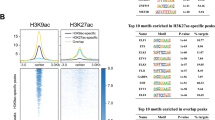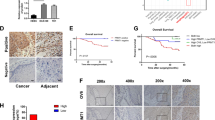Abstract
Esophageal squamous cell carcinoma (ESCC) is a predominant subtype of esophageal cancer (EC) and has a poor prognosis due to its aggressive nature. Accordingly, it is necessary to find novel prognostic biomarkers and therapeutic targets for ESCC. Lysine-specific histone demethylase 1 (LSD1) plays a core role in the regulation of ESCC oncogenesis. However, the detailed mechanism of LSD1-regulated ESCC growth has not been elucidated. This study aims to explore molecular mechanism underlying the LSD1-regulated ESCC’s oncogenesis. After LSD1 silencing, we detected differentially expressed genes (DEGs) in human ESCC cell line, TE-1, by transcriptome sequencing. Subsequently, we investigated expression pattern of the selected molecules in the ESCC tissues and cell lines by qRT-PCR and Western blotting. Furthermore, we explored the roles of selected molecules in ESCC using gene silencing and overexpression assays. Transcriptome sequencing showed that the expression of dual specificity phosphatase 4 (DUSP4) in TE-1 was significantly attenuated after the LSD1 silencing. In addition, the DUSP4 mRNA expression level was significantly higher in the ESCC tissues, especially in those derived from patients with invasion or metastasis. Moreover, the DUSP4 expression was positively associated with the LSD1 expression in the ESCC tissues. DUSP4 overexpression promoted proliferation, invasion, and migration of the ESCC cells, while DUSP4 silencing had an opposite effect. DUSP4 overexpression also enhanced tumorigenicity of the ESCC cells in vivo, while DUSP4 silencing inhibited tumor growth. Importantly, inhibition of cell proliferation, invasion, and migration by the LSD1 inhibitor (ZY0511) was reversed by DUSP4 overexpression. Conclusively, we found that LSD1 promotes ESCC’s oncogenesis by upregulating DUSP4, the potential therapeutic and diagnostic target in ESCC.





Similar content being viewed by others
Abbreviations
- CCK-8:
-
Cell Counting Kit-8
- DEGs:
-
differentially expressed genes
- DUSP4:
-
dual specificity phosphatase 4
- EC:
-
esophageal cancer
- ESCC:
-
esophageal squamous cell carcinoma
- H3K4me2:
-
histone H3 di-methylation at lysine 4
- LSD1:
-
lysine-specific histone demethylase 1
References
Pennathur, A., Gibson, M. K., Jobe, B. A., and Luketich, J. D. (2013) Oesophageal carcinoma, Lancet, 38, 400-412.
Umar, S. B., and Fleischer, D. E. (2018) Esophageal cancer: epidemiology, pathogenesis and prevention, Nat. Clin. Pract. Gastroenterol. Hepatol., 5, 517-526.
Matsuda, T., Ajiki, W., Marugame, T., Ioka, A., Tsukuma, H., et al. (2011) Population-based survival of cancer patients diagnosed between 1993 and 1999 in Japan: a chronological and international comparative study, Jpn. J. Clin. Oncol., 41, 40-51.
McGraw, S., Vigneault, C., and Sirard, M. A. (2007) Temporal expression of factors involved in chromatin remodeling and in gene regulation during early bovine in vitro embryo development, Reproduction, 133, 597-608.
Wang, Q., Xu, X., Li, J., Liu, J., Gu, H., et al. (2011) Lithium, an anti-psychotic drug, greatly enhances the generation of induced pluripotent stem cells, Cell. Res., 21, 1424-1435.
Sakane, N., Kwon, H. S., Pagans, S., Kaehlcke, K., Mizusawa, Y., et al. (2011) Activation of HIV transcription by the viral Tat protein requires a demethylation step mediated by lysine-specific demethylase 1 (LSD1/KDM1), PLoS Pathog., 7, e1002184.
Lv, T., Yuan, D., Miao, X., Lv, Y., Zhan, P., et al. (2012) Over-expression of LSD1 promotes proliferation, migration and invasion in non-small cell lung cancer, PLoS One, 7, e35065.
Amente, S., Lania, L., and Majello, B. (2013) The histone LSD1 demethylase in stemness and cancer transcription programs, Biochim. Biophys. Acta, 1829, 981-986.
Ding, J., Zhang, Z. M., Xia, Y., Liao, G. Q., Pan, Y., et al. (2013) LSD1-mediated epigenetic modifcation contributes to proliferation and metastasis of colon cancer, Br. J. Cancer, 109, 994-1003.
Wu, Y., Wang, Y., Yang, X. H., Kang, T., Zhao, Y., et al. (2013) The deubiquitinase USP28 stabilizes LSD1 and confers stem-cell-like traits to breast cancer cells, Cell. Rep., 5, 224-236.
Yu, Y., Wang, B., Zhang, K., Lei, Z., Guo, Y., et al. (2013) High expression of lysine-specific demethylase 1 correlates with poor prognosis of patients with esophageal squamous cell carcinoma, Biochem. Biophys. Res. Commun., 437, 192-198.
Hoshino, I., Akutsu, Y., Murakami, K., Akanuma, N., Isozaki, Y., et al. (2016) Histone demethylase LSD1 inhibitors prevent cell growth by regulating gene expression in esophageal squamous cell carcinoma cells, Ann. Surg. Oncol., 23, 312-320.
Wang, B., Zhao, B., Pang, L. P., Zhao, Y. D., Guo, Q., et al. (2017) LPE-1, an orally active pyrimidine derivative, inhibits growth and mobility of human esophageal cancers by targeting LSD1, Pharmacol. Res., 122, 66-77.
Alsaqer, S. F., Tashkandi, M. M., Kartha, V. K., Yang, Y. T., Alkheriji, Y., et al. (2017) Inhibition of LSD1 epigenetically attenuates oral cancer growth and metastasis, Oncotarget, 8, 73372-73386.
Lu, Z., Ren, Y., Zhang, M., Fan, T., Wang, Y., et al. (2018) FLI-06 suppresses proliferation, induces apoptosis and cell cycle arrest by targeting LSD1 and Notch pathway in esophageal squamous cell carcinoma cells, Biomed. Pharmacother., 107, 1370-1376.
Hou, G., Zhao, Q., Zhang, M., Wang, P., Ye, H., et al. (2019) LSD1 regulates Notch and PI3K/Akt/mTOR pathways through binding the promoter regions of Notch target genes in esophageal squamous cell carcinoma, Onco Targets. Ther., 12, 5215-5225.
Peng, W., Zhang, H., Tan, S., Li, Y., Zhou, Y., et al. (2020) Synergistic antitumor effect of 5-fluorouracil with the novel LSD1 inhibitor ZY0511 in colorectal cancer, Ther. Adv. Med. Oncol., 12, 1758835920937428.
Li, Y., Tao, L., Zuo, Z., Zhou, Y., Qian, X., et al. (2019) ZY0511, a novel, potent and selective LSD1 inhibitor, exhibits anticancer activity against solid tumors via the DDIT4/mTOR pathway, Cancer Lett., 454, 179-190.
Li, S., Lin, Z., Zheng, W., Zheng, L., Chen, X., et al. (2019) IL-17A inhibits autophagic activity of HCC cells by inhibiting the degradation of Bcl2, Biochem. Biophys. Res. Commun., 509, 194-200.
Popova, E. Y., Pinzon-Guzman, C., Salzberg, A. C., Zhang, S. S., and Barnstable, C. J. (2016) LSD1-mediated demethylation of H3K4me2 Is required for the transition from late progenitor to differentiated mouse rod photoreceptor, Mol. Neurobiol., 53, 4563-4581.
Liu, Y. W., Xia, R., Lu, K., Xie, M., Yang, F., et al. (2017) LincRNAFEZF1-AS1 represses p21 expression to promote gastric cancer proliferation through LSD1-Mediated H3K4me2 demethylation, Mol. Cancer, 16, 39.
Gaedcke, J., Grade, M., Jung, K., Camps, J., Jo, P., et al. (2010) Mutated KRAS results in overexpression of DUSP4, a MAP-kinase phosphatase, and SMYD3, a histone methyltransferase, in rectal carcinomas, Genes Chromosomes Cancer, 49, 1024-1034.
Gröschl, B., Bettstetter, M., Giedl, C., Woenckhaus, M., Edmonston, T., et al. (2013) Expression of the MAP kinase phosphatase DUSP4 is associated with microsatellite instability in colorectal cancer (CRC) and causes increased cell proliferation, Int. J. Cancer, 132, 1537-1546.
Wang, H. Y., Cheng, Z., and Malbon, C. C. (2003) Overexpression of mitogen-activated protein kinase phosphatases MKP1, MKP2 in human breast cancer, Cancer Lett., 191, 229-237.
Yin, Y., Liu, Y. X., Jin, Y. J., Hall, E. J., and Barrett, J. C. (2003) PAC1 phosphatase is a transcription target of p53 in signaling apoptosis and growth suppression, Nature, 422, 527-531.
Yip-Schneider, M. T., Lin, A., and Marshall, M. S. (2001) Pancreatic tumor cells with mutant K-ras suppress ERK activity by MEK-dependent induction of MAP kinase phosphatase-2, Biochem. Biophys. Res. Commun., 280, 992-997.
Zhang, R., Wang, G., Zhang, P. F., Zhang, J., Huang, Y. X., et al. (2017) Sanguinarine inhibits growth and invasion of gastric cancer cells via regulation of the DUSP4/ERK pathway, J. Cell. Mol. Med., 21, 1117-1127.
Xu, X. F., Gao, F., Wang, J. J., Tao, L., Ye, J. S., et al. (2018) MiR-122-5p inhibits cell migration and invasion in gastric cancer by down-regulating DUSP4, Cancer. Biol. Ther., 19, 427-435.
De Vriendt, V., De Roock, W., Di Narzo, A. F., Tian, S., et al. (2013) DUSP 4 expression identifies a subset of colorectal cancer tumors that differ in MAPK activation, regardless of the genotype, Biomarkers, 18, 516-524.
Thienpont, B., Steinbacher, J., Zhao, H., D’Anna, F., Kuchnio, A., et al. (2016) Tumour hypoxia causes DNA hypermethylation by reducing TET activity, Nature, 537, 63-68.
Dougherty, J. A., Kilbane Myers, J., Khan, M., Angelos, M. G., and Chen, C. A. (2017) Dual-specificity phosphatase 4 overexpression in cells prevents hypoxia/reoxygenation-induced apoptosis via the upregulation of eNOS, Front. Cardiovasc. Med., 4, 22.
Kim, D., Kim, K. I., and Baek, S. H. (2021) Roles of lysine-specific demethylase 1 (LSD1) in homeostasis and diseases, J. Biomed. Sci., 28, 41.
Funding
This work was supported by the Basic Scientific Research Projects of Fujian Provincial Public Welfare Scientific Research Institutes (2016R1029-2, 2019R1011-3) and by the Fujian Health and Family Planning Scientific Research Talent Training Project (2018-ZQN-20).
Author information
Authors and Affiliations
Corresponding authors
Ethics declarations
The authors declare no conflict of interests in financial or any other sphere. All applicable international, national, and/or institutional guidelines for the care and use of animals were followed.
Electronic supplementary material
Rights and permissions
About this article
Cite this article
Han, J., Ye, S., Chen, J. et al. Lysine-Specific Histone Demethylase 1 Promotes Oncogenesis of the Esophageal Squamous Cell Carcinoma by Upregulating DUSP4. Biochemistry Moscow 86, 1624–1634 (2021). https://doi.org/10.1134/S0006297921120117
Received:
Revised:
Accepted:
Published:
Issue Date:
DOI: https://doi.org/10.1134/S0006297921120117




